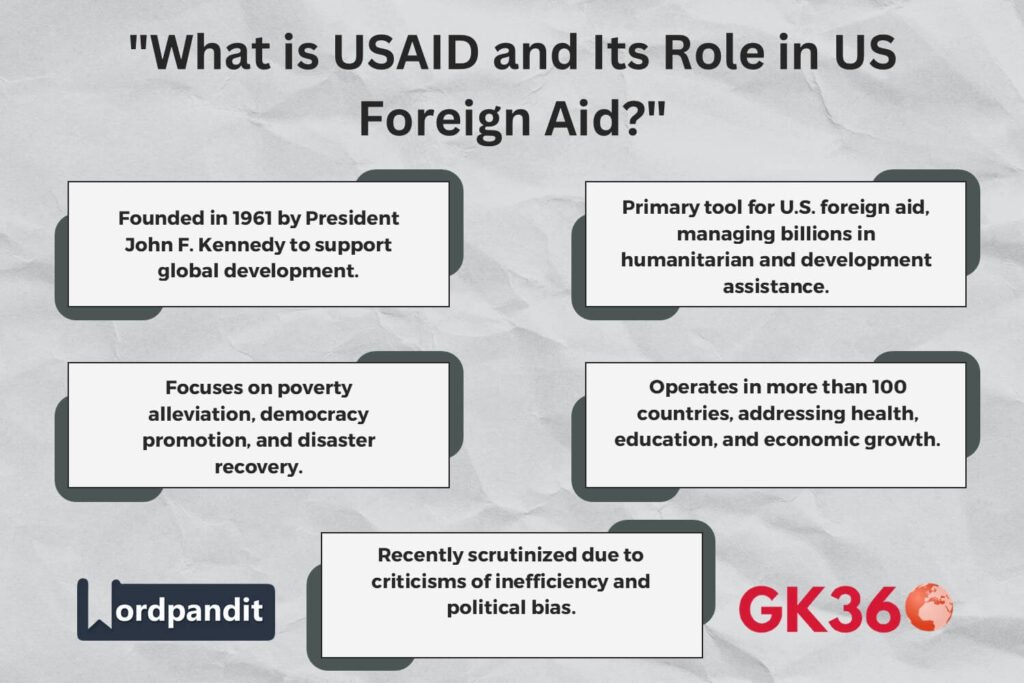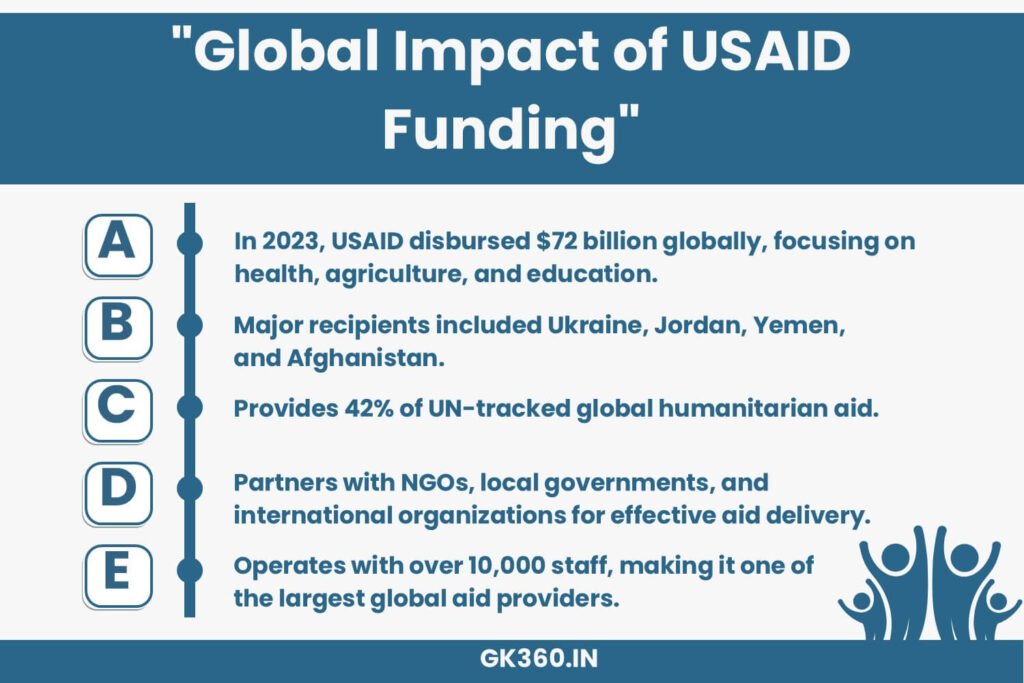Elon Musk’s Call to Abolish USAID: What It Means for US Foreign Aid and Global Impact
Introduction
The United States Agency for International Development (USAID) is the primary agency through which the U.S. administers foreign aid, helping to advance global development, humanitarian response, and promote democratic reforms. Founded in 1961 by President John F. Kennedy, USAID was designed to provide economic and humanitarian assistance to countries in need, especially in the context of the Cold War. Its mission continues today with a focus on fostering poverty alleviation, democracy promotion, and disaster recovery.
Over the years, USAID has grown into one of the most influential aid organizations in the world, mobilizing billions in funding for a variety of global initiatives, from public health programs to economic development and climate change mitigation. However, its role and influence have come under scrutiny, particularly with Elon Musk’s recent call to dismantle the agency. Musk, who was appointed to lead the Department of Government Efficiency (DOGE), argued that USAID operates as a “criminal organization” and should be shut down, sparking a heated debate over the future of U.S. foreign aid.

Table of Contents
- Introduction
- What is USAID and Why It Matters in US Foreign Aid?
- How USAID Distributes Funding: Key Recipients and Global Impact
- Criticism of USAID: Foreign Policy Concerns and Operational Inefficiencies
- Global Consequences of USAID’s Closure: Geopolitical and Humanitarian Fallout
- Conclusion: The Future of US Foreign Aid
- FAQs
What is USAID and Why It Matters in US Foreign Aid?
The United States Agency for International Development (USAID) is the primary agency through which the U.S. administers foreign aid, helping to advance global development, humanitarian response, and promote democratic reforms. Founded in 1961 by President John F. Kennedy, USAID was designed to provide economic and humanitarian assistance to countries in need, especially in the context of the Cold War. Its mission continues today with a focus on fostering poverty alleviation, democracy promotion, and disaster recovery.
Over the years, USAID has grown into one of the most influential aid organizations in the world, mobilizing billions in funding for a variety of global initiatives, from public health programs to economic development and climate change mitigation. However, its role and influence have come under scrutiny, particularly with Elon Musk’s recent call to dismantle the agency. Musk, who was appointed to lead the Department of Government Efficiency (DOGE), argued that USAID operates as a “criminal organization” and should be shut down, sparking a heated debate over the future of U.S. foreign aid.
How USAID Distributes Funding: Key Recipients and Global Impact
In fiscal year 2023, USAID disbursed $72 billion globally in humanitarian and development aid, making it a cornerstone of U.S. foreign assistance. This funding is allocated across a variety of critical sectors, including healthcare, energy security, and sustainable agriculture. The agency supports projects that tackle everything from malaria control and vaccination programs to climate resilience in vulnerable countries.
Key recipients of USAID funding in 2023 included Ukraine ($14.4 billion), Jordan, Yemen, and Afghanistan. These regions, often facing political instability or conflict, received significant support for rebuilding efforts, humanitarian relief, and governance reforms. USAID also works in partnership with international organizations, NGOs, and local governments to deliver aid more effectively and ensure sustainability.
USAID’s funding also positions it as a major player in global humanitarian assistance, accounting for roughly 42% of all UN-tracked aid. With a team of over 10,000 staff members, the agency is one of the largest providers of development assistance globally, shaping policies and supporting projects that have long-term positive effects on communities worldwide.
Criticism of USAID: Foreign Policy Concerns and Operational Inefficiencies
Despite its impressive scope, USAID has faced significant criticism over the years, especially regarding its alignment with U.S. foreign policy. Critics argue that the agency’s aid is often used as a tool of political influence, rather than purely humanitarian assistance. For example, the Cuban Twitter project, an initiative designed to circumvent the Cuban government’s control over communication, was widely criticized for being a covert political maneuver under the guise of providing aid.
In addition, USAID has been accused of inefficiencies in its operations, particularly regarding the management of indirect costs and audits that highlight potential waste. Such inefficiencies, coupled with its bureaucratic structure, have sometimes delayed critical aid, undermining its effectiveness in urgent situations like natural disasters or humanitarian crises.
Another frequent criticism centers on USAID’s contracting practices, with several audits revealing that millions of dollars were allocated to poorly managed programs. These criticisms have led many to question whether the agency’s goals—such as promoting democratic reforms and aiding vulnerable populations—are fully realized or compromised by political agendas and mismanagement.
Global Consequences of USAID’s Closure: Geopolitical and Humanitarian Fallout
The potential closure of USAID would have wide-reaching implications for global development and U.S. foreign policy. If Musk’s call to dismantle the agency were heeded, the U.S. would lose its primary tool for administering large-scale humanitarian aid, opening the door for other global powers to fill the gap.
China, for instance, has been expanding its foreign aid programs, often offering infrastructure and economic support to countries that have historically relied on USAID. This shift could lead to a realignment of global alliances, particularly in regions like Africa, Eastern Europe, and Asia—areas where U.S. aid has been pivotal in shaping political stability and fostering economic growth. In fact, countries receiving large portions of U.S. aid, such as Ukraine and Afghanistan, may find themselves turning to other powers like China or Russia for support, potentially undermining U.S. influence in these key regions.
Moreover, humanitarian aid would also take a significant hit. Without USAID’s established network, responding to natural disasters, disease outbreaks, or refugee crises would become more difficult and less effective. Nations struggling with health crises, such as the COVID-19 pandemic or ongoing outbreaks of diseases like cholera and Ebola, would face a diminished response, resulting in even higher mortality rates and a slower path to recovery.
Conclusion: The Future of US Foreign Aid
The debate over USAID’s future touches on larger questions about the role of foreign aid in shaping international relations and U.S. influence. While critics like Elon Musk highlight valid concerns about the agency’s efficiency and political biases, USAID’s global impact cannot be denied. It remains a critical component of U.S. soft power, using aid to not only provide immediate relief but also to promote long-term development and stability in some of the world’s most vulnerable regions.
As the U.S. re-evaluates its approach to foreign aid, the question becomes not whether aid should continue, but how it can be delivered in a more transparent, efficient, and politically neutral manner. The closure of USAID would leave a significant void in global development, and it’s clear that a thoughtful approach to reforming the system—rather than dismantling it entirely—would better serve both U.S. interests and the global community.
FAQs
What is the history of USAID?
USAID was founded in 1961 by President John F. Kennedy to streamline U.S. foreign assistance efforts and support global development and humanitarian programs. It has since become a key player in global aid and development.
How does USAID fund foreign aid programs?
USAID funds a wide range of programs through grants and partnerships with governments, NGOs, and international organizations. It supports initiatives in health, education, agriculture, infrastructure, and democracy promotion.
Why has USAID faced criticism?
Critics argue that USAID’s funding sometimes serves political purposes rather than purely humanitarian goals. It has also been criticized for inefficiencies in managing aid programs and for covertly supporting political movements, such as the Cuban Twitter project.
What are the geopolitical implications of cutting USAID’s budget?
If USAID were shut down, rival powers like China and Russia could expand their influence in regions that have historically relied on U.S. aid, leading to a shift in global alliances and a potential decline in U.S. geopolitical standing.
How does USAID impact global development?
USAID is vital in providing emergency relief during crises, building infrastructure, promoting sustainable development, and addressing global challenges like climate change, healthcare access, and poverty alleviation.
Key Takeaways
| Aspect | Details |
|---|---|
| What is USAID? | USAID, founded in 1961, is the U.S. agency for administering foreign aid, focusing on global development, health, and humanitarian assistance. |
| USAID’s Global Funding | In FY 2023, USAID allocated $72 billion globally, addressing sectors like healthcare, agriculture, and disaster recovery. |
| Major USAID Recipients | Key recipients include Ukraine, Jordan, Yemen, and Afghanistan, which receive aid for political stability and recovery. |
| Criticisms of USAID | Criticized for political biases in aid distribution, inefficiencies, and covert operations like the Cuban Twitter project. |
| Geopolitical Impact of Closing USAID | The potential closure of USAID could allow other global powers, like China and Russia, to fill the void in aid, shifting global alliances. |
| USAID’s Operational Challenges | Concerns over bureaucratic inefficiencies and poorly managed programs have hindered USAID’s effectiveness in urgent situations. |
| Future of U.S. Foreign Aid | Debate centers on reforming USAID’s operations for transparency, efficiency, and political neutrality rather than dismantling it. |
Related Terms:
- USAID
- US Foreign Aid
- Global Development
- Humanitarian Aid
- Foreign Policy
- Elon Musk USAID Debate
- International Assistance
- Geopolitical Impact
- USAID Funding Breakdown
- U.S. Aid Recipients






